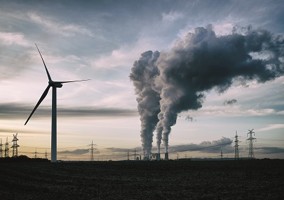The question of how to invest responsibly in the transition away from fossil fuels has got more complicated since Russia invaded Ukraine. The invasion has driven concerns about energy security right to the top of the policy agenda. At the same time, growing international sanctions against Russian fossil fuels have pushed up energy costs for billions of consumers. This, in turn, has triggered some calls to increase oil and gas production elsewhere.
What does this all mean for the energy majors, investors and consumers amid the battle against climate change?
A perfect storm?
Old hands in the energy industry talk of the ‘energy trilemma’: the competing and sometimes hard to reconcile aspects of security of supply, affordability and dealing with climate change. Last year’s Glasgow COP summit, along with urgent reports that preceded it, focused attention on the fight to limit climate change. Yet the affordability question was creeping back into view long before Russian tanks rolled over the Ukrainian border. The energy industry seems caught in the middle of a perfect storm.
Fossil fuel companies were already being called on to accelerate investment and production to head off a damaging leap in oil and gas prices before Russia’s invasion and threats to its energy exports made matters much worse. For most companies, increasing demand in itself would not be a bad thing, but fossil fuel producers face the thorniest problem: future demand for their products is in serious question if the world is to abide by its emission reduction goals. In this context, it might make business sense to make up the energy shortfall by shifting the risk to other industries or by investing as little in the remedy as possible. Unfortunately, the easier methods – coal and fracking – have high environmental costs.
Cut your principles, or cut demand?
What does this all mean for the companies in the middle of the trilemma, with two pressing short-term crises enveloped in a long-term existential threat?
In the wake of the invasion, the energy majors faced immediate concerns about the ethics of doing business with Russia. Most responded quickly: BP is selling its stake in Rosneft, while Shell is withdrawing from Russian oil and gas activities. At the same time, the industry is buoyed by the highest oil and gas prices for many years. How and where they choose to invest the unexpected surplus is crucial.
And what of consumers? Sky high energy bills and a looming cost of living crisis are at their door. In one sense, as the old adage goes, the solution to high energy prices is high energy prices. People take very careful stock of their usage and tend to reduce demand naturally. But that might not be enough to soften the landing from the crisis in the energy markets, especially among the vulnerable.
Governments across Europe have scrambled to protect consumers via a range of support initiatives, some funded by windfall taxes imposed on the companies profiting from the price surge. In the UK, Chancellor Rishi Sunak is to raise £5 billion with what he terms a “temporary, targeted energy profits levy” to help pay for a £15 bn package intended to soften the impact of price hikes. This may ease some shorter-term pressures on consumers (and, indeed, on the government they elect). But the Chancellor has been criticised for proffering generous investment allowances to the oil and gas industry to offset the impact of the levy: energy companies will be allowed to offset up to 91% of this tax on their excess profits against new investment.
While it may be expedient to address short-term supply constraints by giving the green light to renewed investment in coal and gas power, a cleaner and more productive way to reduce energy costs would be to curb energy demand by insulating Britain’s notoriously creaky homes. Households are the largest UK users of natural gas, and make up about 17% of the nation’s greenhouse gas emissions.
An energy efficiency lobby group calculates that improving the nation’s 15 million worst insulated homes would save households £500 a year, which equates to somewhere in the region of £7.5 billion of recurring savings. That saved money could then be spent or invested by families, which would in turn benefit businesses and also the government, in terms of increased tax revenues. Perhaps ‘Insulating Britain’ will be a far less divisive issue in 2022.
Thinking about the future
To ignore the long-term climate crisis while minds are understandably focused on dealing with the immediate turmoil of the war in Ukraine and soaring energy prices would be a mistake. Despite the energy sector’s rising profits (and the recent outperformance of its shares), the world needs more renewable energy, not more oil and gas.
The energy transition was never going to be straightforward, and it’s still possible to make short-term decisions within a long-term framework which protects our shared future. Governments have a vital role to play in ensuring their long-term energy strategies get the balance right.
Protecting our climate and ensuring security of energy supply need not be irreconcilable. In fact, solving one may solve the other. As German Finance Minister Christian Lindner said, “'Renewable energy is freedom energy.”
Matt Crossman is stewardship director at Rathbones
Related articles












